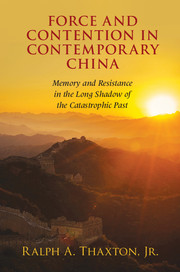 Force and Contention in Contemporary China
Force and Contention in Contemporary China Book contents
- Frontmatter
- Dedication
- Contents
- List of Illustrations
- Acknowledgments
- Cast of Characters for Da Fo Village and Several Other Villages in the Hebei-Shandong-Henan Border Area, 1945–2013
- Maps
- Introduction
- 1 The Violent Dawn of Reform
- 2 Contemporary Tax Resistance and the Memory of the Great Leap
- 3 Birth Planning and Popular Resistance
- 4 Rural Schools and the “Best Citizens of the State”: The Struggle for Knowledge and Empowerment in the Aftermath of the Great Leap
- 5 Official Corruption and Popular Contention in the Reform Era
- 6 The Rise of the Electricity Tigers: Monopoly, Corruption, and Memory
- 7 The Defeat of the Democratic Experiment and Its Consequences
- 8 Contentious Petitioners and the Revival of Mao-Era Repression
- 9 Migration and Contention in the Construction Sector
- 10 The Rise of the Martial Artists and the Two Faces of Mafia
- Conclusion: Big Questions and Small Answers from Da Fo
- Bibliography
- Index
- Miscellaneous Endmatter
10 - The Rise of the Martial Artists and the Two Faces of Mafia
Published online by Cambridge University Press: 05 August 2016
- Frontmatter
- Dedication
- Contents
- List of Illustrations
- Acknowledgments
- Cast of Characters for Da Fo Village and Several Other Villages in the Hebei-Shandong-Henan Border Area, 1945–2013
- Maps
- Introduction
- 1 The Violent Dawn of Reform
- 2 Contemporary Tax Resistance and the Memory of the Great Leap
- 3 Birth Planning and Popular Resistance
- 4 Rural Schools and the “Best Citizens of the State”: The Struggle for Knowledge and Empowerment in the Aftermath of the Great Leap
- 5 Official Corruption and Popular Contention in the Reform Era
- 6 The Rise of the Electricity Tigers: Monopoly, Corruption, and Memory
- 7 The Defeat of the Democratic Experiment and Its Consequences
- 8 Contentious Petitioners and the Revival of Mao-Era Repression
- 9 Migration and Contention in the Construction Sector
- 10 The Rise of the Martial Artists and the Two Faces of Mafia
- Conclusion: Big Questions and Small Answers from Da Fo
- Bibliography
- Index
- Miscellaneous Endmatter
Summary
Notwithstanding the Chinese Communist Party (CCP) subversion of the electoral process, the repression of petitioners, and the exploitation of migrant workers, reform-era Da Fo underwent a subtle but profound change in its politics. The Central government wanted to restore the party's hold on local society, but in the Da Fo area the overall balance of power shifted in favor of a seemingly new social force. The shift, however, was orchestrated by the bearers of an age-old rural culture, and they were influenced, and to some extent driven, by memories of Great Leap–era harm. Operating on an alternative social compact and within a new state–market political economy, the leaders of this counterforce occasionally challenged Da Fo's party leaders for control of village politics. In time, their transvillage networks also penetrated the local police forces ensuring CCP control of the countryside, and so there was cooperation as well as conflict with official power.
In the Great Leap Forward, the Maoists had banned martial arts training in Dongle county and its villages. Furthermore, most of the farmers who knew martial arts and taught it to villagers were so emaciated and fatigued that they had no time to practice this activity, let alone to teach it to younger villagers. As a result, few of Da Fo's young villagers learned the arts of self-defense. Its families were more and more at the mercy of village Communist Party bullies who relied on brutal methods to rule. In the two decades following the Great Leap, most Da Fo farmers and their teenage sons were still caught up in a low-grade famine and had to live with long-term poverty and physical diminishment. Under the collective, they received 100 jin of grain per capita less than they needed to meet the minimum annual requirement for grain consumption. Most of them lived on sweet potatoes and other inferior tubers to survive. The teenage children who helped them with planting and harvesting were often very thin and weak, and thus unable to fully engage in family agricultural tasks. Once Da Fo party boss Bao Zhilong regained power in the last years of the Cultural Revolution, moreover, farmers’ fears of having to deal with commando Bao and his brutish clients and cronies were renewed.
- Type
- Chapter
- Information
- Force and Contention in Contemporary ChinaMemory and Resistance in the Long Shadow of the Catastrophic Past, pp. 346 - 389Publisher: Cambridge University PressPrint publication year: 2016


